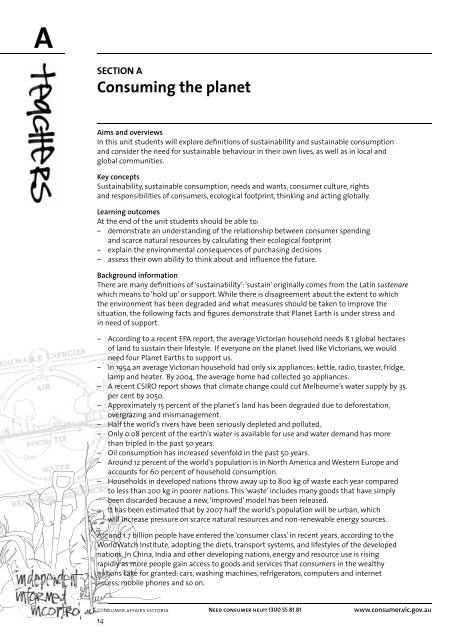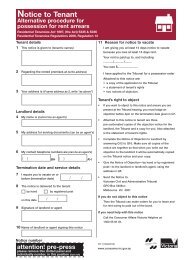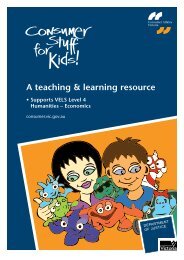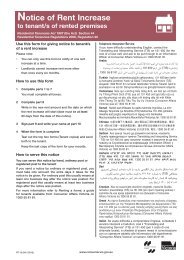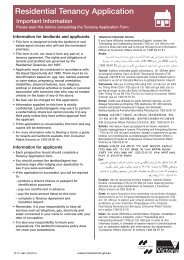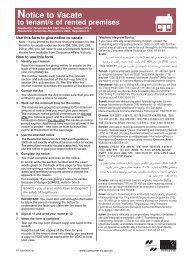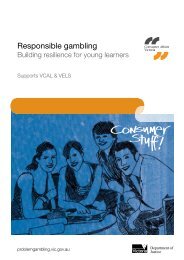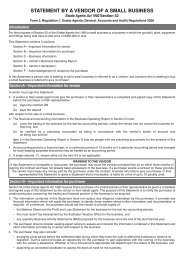A resource for teaching and learning about consuming planet earth
A resource for teaching and learning about consuming planet earth
A resource for teaching and learning about consuming planet earth
Create successful ePaper yourself
Turn your PDF publications into a flip-book with our unique Google optimized e-Paper software.
A<br />
SECTION A<br />
Consuming the <strong>planet</strong><br />
Aims <strong>and</strong> overviews<br />
In this unit students will explore defi nitions of sustainability <strong>and</strong> sustainable consumption<br />
<strong>and</strong> consider the need <strong>for</strong> sustainable behaviour in their own lives, as well as in local <strong>and</strong><br />
global communities.<br />
Key concepts<br />
Sustainability, sustainable consumption, needs <strong>and</strong> wants, consumer culture, rights<br />
<strong>and</strong> responsibilities of consumers, ecological footprint, thinking <strong>and</strong> acting globally.<br />
Learning outcomes<br />
At the end of the unit students should be able to:<br />
– demonstrate an underst<strong>and</strong>ing of the relationship between consumer spending<br />
<strong>and</strong> scarce natural <strong>resource</strong>s by calculating their ecological footprint<br />
– explain the environmental consequences of purchasing decisions<br />
– assess their own ability to think <strong>about</strong> <strong>and</strong> infl uence the future.<br />
Background in<strong>for</strong>mation<br />
There are many defi nitions of ‘sustainability’: ‘sustain’ originally comes from the Latin sustenare<br />
which means to ‘hold up’ or support. While there is disagreement <strong>about</strong> the extent to which<br />
the environment has been degraded <strong>and</strong> what measures should be taken to improve the<br />
situation, the following facts <strong>and</strong> fi gures demonstrate that Planet Earth is under stress <strong>and</strong><br />
in need of support.<br />
– According to a recent EPA report, the average Victorian household needs 8.1 global hectares<br />
of l<strong>and</strong> to sustain their lifestyle. If everyone on the <strong>planet</strong> lived like Victorians, we would<br />
need four Planet Earths to support us.<br />
– In 1954 an average Victorian household had only six appliances: kettle, radio, toaster, fridge,<br />
lamp <strong>and</strong> heater. By 2004, the average home had collected 30 appliances.<br />
– A recent CSIRO report shows that climate change could cut Melbourne’s water supply by 35<br />
per cent by 2050.<br />
– Approximately 15 percent of the <strong>planet</strong>’s l<strong>and</strong> has been degraded due to de<strong>for</strong>estation,<br />
overgrazing <strong>and</strong> mismanagement.<br />
– Half the world’s rivers have been seriously depleted <strong>and</strong> polluted.<br />
– Only 0.08 percent of the <strong>earth</strong>’s water is available <strong>for</strong> use <strong>and</strong> water dem<strong>and</strong> has more<br />
than tripled in the past 50 years.<br />
– Oil consumption has increased sevenfold in the past 50 years.<br />
– Around 12 percent of the world’s population is in North America <strong>and</strong> Western Europe <strong>and</strong><br />
accounts <strong>for</strong> 60 percent of household consumption.<br />
– Households in developed nations throw away up to 800 kg of waste each year compared<br />
to less than 200 kg in poorer nations. This ‘waste’ includes many goods that have simply<br />
been discarded because a new, ‘improved’ model has been released.<br />
– It has been estimated that by 2007 half the world’s population will be urban, which<br />
will increase pressure on scarce natural <strong>resource</strong>s <strong>and</strong> non-renewable energy sources.<br />
Around 1.7 billion people have entered the ‘consumer class’ in recent years, according to the<br />
WorldWatch Institute, adopting the diets, transport systems, <strong>and</strong> lifestyles of the developed<br />
nations. In China, India <strong>and</strong> other developing nations, energy <strong>and</strong> <strong>resource</strong> use is rising<br />
rapidly as more people gain access to goods <strong>and</strong> services that consumers in the wealthy<br />
nations take <strong>for</strong> granted: cars, washing machines, refrigerators, computers <strong>and</strong> internet<br />
access, mobile phones <strong>and</strong> so on.<br />
consumer affairs victoria<br />
14<br />
Need consumer help? 1300 55 81 81 www.consumer.vic.gov.au


